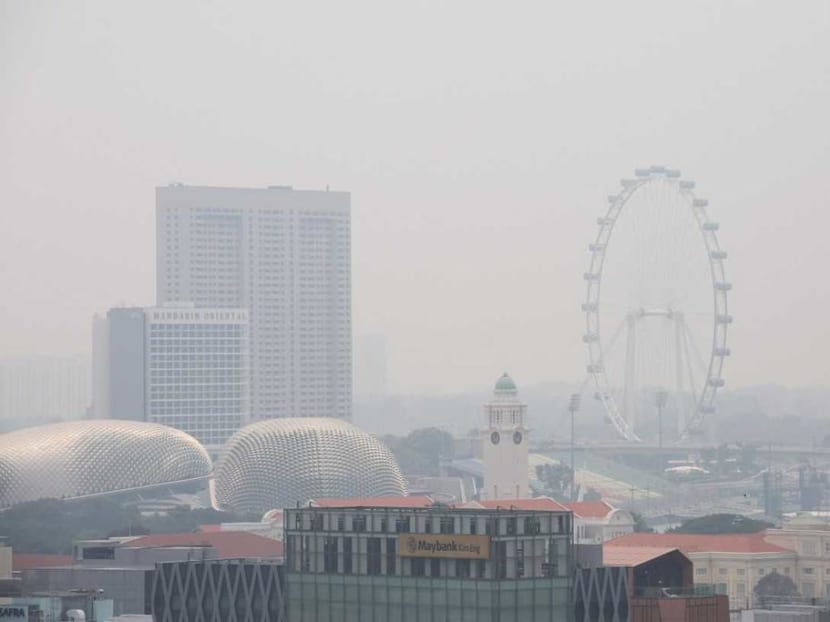Low risk of severe transboundary haze in region this year, thanks partly to Covid-19: Study
SINGAPORE — The risk of severe and prolonged haze across the region this year is low with the Indonesian authorities remaining committed to preventing a repeat of 2019’s unhealthy levels of poor air quality, a Singapore think-tank has concluded.
- There is a low risk of severe transboundary haze occurring in the region this year, a study by think-tank SIIA has found
- The Indonesian government is committed to tackling haze and conducting cloud seeding
- Covid-19 has also disrupted land clearing and planting activities in Indonesia
- Unlike severe haze incidents in 2019 and 2015, weather in the region is expected to be “normal or average” later this year
SINGAPORE — The risk of severe and prolonged haze across the region this year is low with the Indonesian authorities remaining committed to preventing a repeat of 2019’s unhealthy levels of poor air quality, a Singapore think-tank has concluded.
Despite initial fears that the Covid-19 pandemic could contribute to haze, researchers at the Singapore Institute of International Affairs (SIIA) also found that the pandemic has disrupted land clearing and planting activities by farmers, lowering the likelihood of severe haze this year.
Burning off cleared vegetation has contributed to haze in the past.
The assessment was made by SIIA researchers in their third annual edition of the Haze Outlook Report, released on Thursday (June 24).
The report categorises the likelihood of a severe transboundary haze incident occurring according to levels of low, moderate or high risk.
The risk level is assessed based on three factors: The weather, Indonesia’s land management policy and human behaviour.
The first two editions of the annual report, in 2019 and 2020, had predicted a moderate risk of the region experiencing a severe haze incident. This is the first time the report has predicted a low or “green” risk.
Speaking at an online launch event on Thursday, Associate Professor Simon Tay, SIIA chairman, said that the biggest contributor to the lowered risk this year was the positive steps taken by the Indonesian authorities to contain the haze.
Assoc Prof Tay, who also teaches at the National University of Singapore’s law faculty, said: “The renewal of the Peatland and Mangrove Restoration Agency as the special entity is significant. The renewal, we feel, will help deepen (the agency’s) areas and commitments.”
The agency, which is tasked to restore degraded peatland and mangrove ecosystems in Indonesia, had its mandate renewed by the Indonesian government last December.
The report also found that unlike previous transboundary haze incidents in 2019 and 2015, which occurred during severe drought years, weather conditions in the region are expected to be “normal or average” during the dry season from June to September this year.
This means that there is “no elevated risk” of fires and haze due to the weather, the report’s authors wrote.
The report also noted that there are “signals” that Indonesia continues to take forest and land management seriously, even during the Covid-19 pandemic.
For instance, the Peatland and Mangrove Restoration Agency had restored about 835,000ha of peatland in public land by the end of last year — an area more than 10 times the size of Singapore. Most of the fires in Indonesia occur on dry peatland, leading to haze.
The Indonesian authorities have also continued to carry out weather modification efforts such as cloud seeding, a technique to promote rain, since last year.
Touching on the impact of human behaviour, Assoc Prof Tay said that when the pandemic hit last year, there was uncertainty over how it would affect outreach and education efforts to stop unsafe practices leading to fires in Indonesia.
There was also concern that farmers would rush to clear land to cash in on rising agricultural commodity prices due to Covid-19.
However, the report assessed that the pandemic had disrupted land clearing and planting activities by small farmers and bigger-scale businesses instead, lowering the risk of a severe haze incident this year.
Most companies interviewed by the researchers also said that plantations are a long-cycle business. This means that firms are unlikely to plant more as an immediate reaction to shifts in the market.
Responding to a question at the launch on where the region stands now that it has missed the target set by the Association of Southeast Asian Nations (Asean) to be transboundary haze-free by 2020, Assoc Prof Tay said that while zero haze is a “great target”, it will be difficult to get there.









